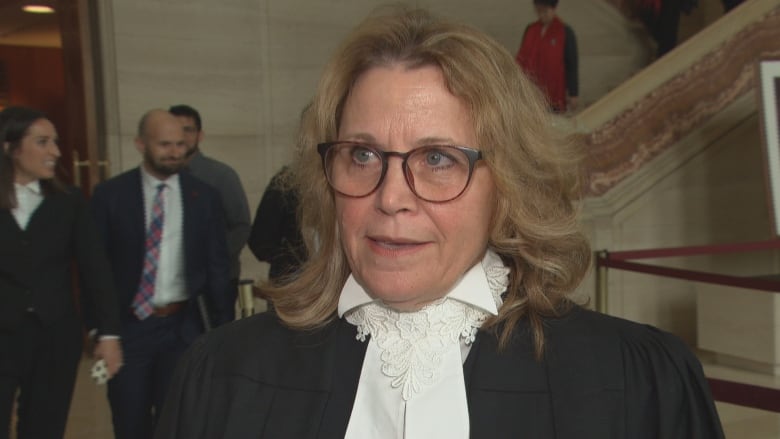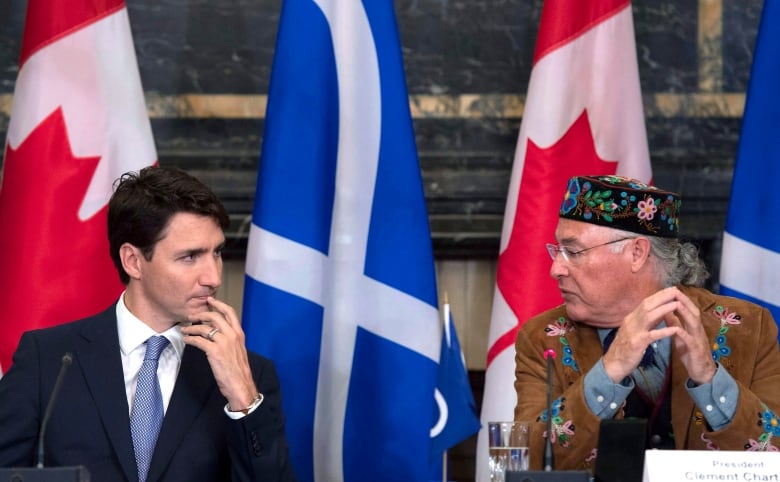The Métis National Council's new leader has a date with the Pope and divisions to heal
Cassidy Caron's election represents generational change at the MNC
Cassidy Caron never asked to lead the Métis National Council (MNC) during one of the most pivotal times in the organization's history.
On the night before the recent MNC election, the 29-year-old — who was born in Rossland, B.C. and has family roots in the historic Métis communities of Batoche and St. Louis, Sask. — was brought into a Saskatoon hotel room. She was told by MNC delegates that they needed someone who could work for and with all Métis governments.
Caron decided to let her name stand as a nominee. The next day she was propelled into the top role, replacing Clément Chartier — the first change in the top leadership at the MNC in 18 years. She also became the first woman elected to hold the position.
"It was very exciting, a little overwhelming, of course. It's a big role," said Caron. "It's just time for this change."
Caron is now leading the MNC at a time when Métis interests are playing a central role in the federal government's reconciliation agenda. She will also represent the Métis people during an audience with Pope Francis in Rome next month, as pressure builds on the Vatican to deliver an apology for residential schools.
Caron is taking the helm of the organization during one of its most turbulent periods. Tensions over identity and who can speak for the Métis have fractured the MNC. One of its central pillars, the Manitoba Métis Federation (MMF), quit the national body earlier this year over membership practices involving the Métis Nation of Ontario.
MMF president David Chartrand was the MNC's interim national spokesperson shortly before the split. Chartrand said he has no plans to rejoin the MNC, but Caron has said she would welcome the MMF back at any time.
Those who are still part of the MNC say Caron is the right person to rebuild the organization.
"President Caron, I think, is somebody who truly is really approaching this work as a nation builder," said Margaret Froh, president of the Métis Nation of Ontario, who nominated Caron.
"She's a fresh young face who brings a tremendous amount of community cultural experience and grounding."

Prominent Métis lawyer Jean Teillet, who argued for Métis rights before Canada's highest court, said Caron represents the next phase in the leadership of the Métis people.
"It's definitely a changing of the guard," said Teillet, the great-grandniece of Louis Riel, who led the Metis people in a stand against the Government of Canada during the Northwest Resistance. "A changing of the generations."
With Caron's election, two of the three main national Indigenous organizations are being led by women. Earlier this summer, RoseAnne Archibald was elected as the first female national chief of the Assembly of First Nations. Former Inuit Tapiriit Kanatami president Mary Simon was also appointed Governor General.
Moving self-determination forward
Caron still hasn't had her first phone call with the prime minister. She said that when she does, she will encourage Justin Trudeau to take concrete steps toward reconciliation.
"I want to make sure that the Government of Canada is accountable to our citizens in making those positive changes," she said.
Caron said the relationship between Canada and the MNC is strong.
Since the Trudeau government was elected in 2015, Caron said, the Métis Nation has taken huge strides toward recognition.

Government officials in previous administrations rarely, if ever, mentioned the Métis Nation. Now they are regularly spoken of as a group of distinct Indigenous Peoples.
Recently, Ottawa signed self-government agreements with Métis governments to recognize their citizenship, leadership and government operations. Those agreements give Métis governments the chance to develop their own laws and draft constitutions to govern their communities.
"We don't know what it's going to look like yet, but really what it means is to return to what we call Otipemisiwak, which means the people who own themselves," Caron said.
"The people who govern themselves. Our people know what's right for our people."
Caron will advocate for the implementation of the agreements, which could lead to land claim settlements and possibly federal health coverage — from which Métis people are now excluded.
"We are oftentimes referred to as the forgotten people," Froh said.
"What it will mean for Métis is respect, recognition and support even greater than what we have right now."
Teillet, a treaty negotiator and the author of The North-West Is Our Mother: The Story of Louis Riel's People, the Métis Nation, said self-government is the most important issue facing the Métis.
"Everything that's gone wrong over the last 150, 200 years is because Canada has tried to impose its ideas of what Indigenous people need or how to fix us," Teillet said.
"The new attitude out of Ottawa is very different from that. They're proposing partnerships, they're proposing to bolster self-government to fund self-government ... That's the right answer."

Caron said she also wants to prioritize putting the United Nations Declaration on the Rights of Indigenous Peoples into action and moving forward with the Missing and Murdered Indigenous Women, Girls and 2SLGBTQQIA+ People national action plan.
Preparing to meet the Pope
Caron isn't new to politics. She worked as a provincial youth chair and minister responsible for youth with the Métis Nation British Columbia from 2016 until 2020.
Caron isn't the first female to lead the MNC, either. Audrey Poitras stepped in as the acting national president from 2003 until 2004.
"She has paved the way," Caron said.
Poitras called Caron a voice for all Métis. She said Caron called the first MNC board of governors' meeting in three years after she was elected and the board is planning to meet in Ottawa this week.
"It's about bringing people together," Poitras said. "It's about being accountable, it's about the nation and all of us together."
Caron is also part of an eight-person delegation from the MNC that is meeting weekly to prepare for a one-hour audience with Pope Francis on Sat. Dec. 18 at the Vatican.

Caron said she wants to speak to the Pope about who Métis people are, what their communities were like before colonization and how to restore balance in Métis society.
"Our communities before colonization, they were in balance," Caron said.
"Everybody had a role, everybody had a responsibility and colonization took that away from us. We need healing, and we need community building and rebuilding initiatives."
Métis Elder Norman Fleury, who is also part of the delegation travelling to the Vatican, said that healing starts with Métis people telling their stories in Michif, their language.
"It's not about impressing the Pope," Fleury said. "We're one people. One nation. One voice."
It's not clear if the Pope will apologize for the Roman Catholic Church's role in operating the residential schools where abuses took place when he comes to Canada. Caron said she's hoping this will happen even if delegates leave Rome without a firm commitment.
"In order for reconciliation to move forward, especially with the Catholic Church, and to restore the balance in our communities, it starts with that apology from the Pope," Caron said.
"It's all in the follow up. If this is a one-time visit [to the Vatican] and there's no follow up, then that won't be successful."

